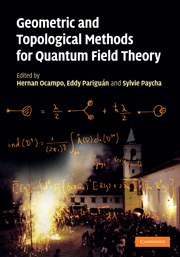Book contents
- Frontmatter
- Contents
- List of contributors
- Introduction
- 1 The impact of QFT on low-dimensional topology
- 2 Differential equations aspects of quantum cohomology
- 3 Index theory and groupoids
- 4 Renormalization Hopf algebras and combinatorial groups
- 5 BRS invariance for massive boson fields
- 6 Large-N field theories and geometry
- 7 Functional renormalization group equations, asymptotic safety, and quantum Einstein gravity
- 8 When is a differentiable manifold the boundary of an orbifold?
- 9 Canonical group quantization, rotation generators, and quantum indistinguishability
- 10 Conserved currents in Kähler manifolds
- 11 A symmetrized canonical determinant on odd-class pseudodifferential operators
- 12 Some remarks about cosymplectic metrics on maximal flag manifolds
- 13 Heisenberg modules over real multiplication noncommutative tori and related algebraic structures
5 - BRS invariance for massive boson fields
Published online by Cambridge University Press: 07 September 2010
- Frontmatter
- Contents
- List of contributors
- Introduction
- 1 The impact of QFT on low-dimensional topology
- 2 Differential equations aspects of quantum cohomology
- 3 Index theory and groupoids
- 4 Renormalization Hopf algebras and combinatorial groups
- 5 BRS invariance for massive boson fields
- 6 Large-N field theories and geometry
- 7 Functional renormalization group equations, asymptotic safety, and quantum Einstein gravity
- 8 When is a differentiable manifold the boundary of an orbifold?
- 9 Canonical group quantization, rotation generators, and quantum indistinguishability
- 10 Conserved currents in Kähler manifolds
- 11 A symmetrized canonical determinant on odd-class pseudodifferential operators
- 12 Some remarks about cosymplectic metrics on maximal flag manifolds
- 13 Heisenberg modules over real multiplication noncommutative tori and related algebraic structures
Summary
Abstract
This chapter corresponds to lectures given at the Villa de Leyva Summer School in Colombia (July 2007). The main purpose in this short treatment of BRS invariance of gauge theories is to illuminate corners of the theory left in the shade by standard treatments. The plan is as follows. First, a review is given of Utiyama's general gauge theory. Immediately we find a counterexample to it in the shape of the massive spin-1 Stückelberg gauge field. This is not fancy, as the massive case is the most natural one to introduce BRS invariance in the context of free quantum fields. Mathematically speaking, the first part of the chapter uses Utiyama's notation, and thus has the flavour and nonintrinsic notation of standard physics textbooks. Next we deal with boson fields on Fock space and BRS invariance in connection with the existence of Krein operators; the attending rigour points are then addressed.
Utiyama's method in classical gauge theory
A historical note
Ryoyu Utiyama developed non-abelian gauge theory early in 1954 in Japan, almost at the same time that Yang and Mills [1] did at the Institute for Advanced Study (IAS) in Princeton, which Utiyama was to visit later in the year. Unfortunately, Utiyama chose not to publish immediately, and upon his arrival at IAS in September of that year, he was greatly discouraged to find he had apparently just been ‘scooped’.
- Type
- Chapter
- Information
- Geometric and Topological Methods for Quantum Field Theory , pp. 220 - 252Publisher: Cambridge University PressPrint publication year: 2010
- 2
- Cited by



